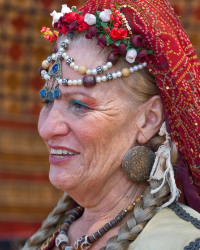Romani originated in India and began spreading westward in the tenth century. By the fourteenth century, large Romani groups were established in the Balkan Mountains of Bulgaria. Some continued to live as nomads; others settled in permanent dwellings. However, regardless of where they lived, to non-Romani, the Romani remained distinct.
Romani call themselves Rom, which in their language means "men." Rom is derived from the Indian word Dom, meaning "a man of low caste who gains his livelihood by singing and dancing." The Romany language, therefore, comes from the name the Romani call themselves. They have several language groups, which are often a hybrid with the local language. In the case of the Anglo-Romani, the language is Angloromani. This language, spoken in the U.K., the U.S., Australia and New Zealand, includes Romani vocabulary and English language syntax. They are sometimes mistaken for the Travelers, a group from the U.K. with a nomadic past. In New Zealand, both Anglo-Romani and Travelers are given minority status.
They often live in villages or near towns or cities. Some still travel, though, by caravans of cars, trucks and trailers.
Stereotypically, they earn their living through fortune-telling, horse trading, entertainment, acrobatics, and metal and woodworking. They are especially known for their musical abilities. Many sing and play instruments at weddings, baptisms, festivals, and other occasions. Unfortunately, they are also known as beggars and thieves. Petty theft (usually by children), and black market peddling sometimes provide families with income. This reputation has caused much discrimination against them. Some Anglo-Romani women work as domestic helpers but are paid very low wages and are given no health benefits.
Social control is very important among the Anglo-Romani. They have their own code of ethics, which includes fidelity and hard work. Their primary loyalty is to their families.
Extended family members usually live together, and those who live in separate homes often telephone or make daily visits to each other.
Parents often arrange marriages, usually when the couple is in their teens. Some Anglo-Romani couples prefer to elope rather than to have a wedding ceremony.
The Anglo-Romani, like other Romani people, adopt the religion of the people around them. They are mainly Christian, and some are strong Christian believers. Many have maintained traditional beliefs that ghosts, lizards, and snakes are capable of harming humans.
The Anglo-Romani people need acceptance. Because of their checkered past, they are often not accepted or trusted by the general public.
Pray that these people who have been rejected will find love and acceptance through Christ.
Ask the Lord to take the Anglo-Romani people to a higher place, where they can shine with the light of Christ.
Ask God to strengthen, encourage, and protect the small number of Romani who have become Christians.
Pray for many Anglo-Romani people in New Zealand to become Christ's disciples, and they will disciple others.
Scripture Prayers for the Anglo-Romani in New Zealand.
https://en.wikipedia.org/wiki/Angloromani_language
https://www.romani.org.nz/about.html#/
https://www.travellerstimes.org.uk/news/2018/02/stop-stealing-our-identity-say-new-zealand-romani-campaigners
| Profile Source: Joshua Project |











